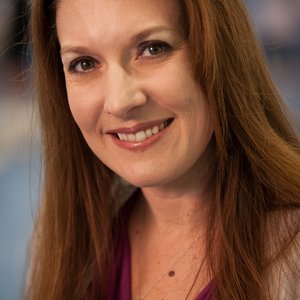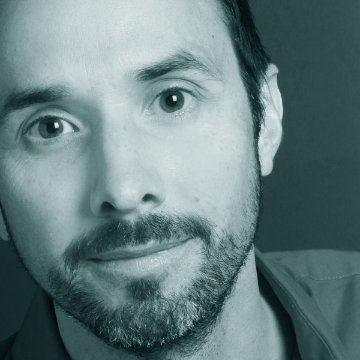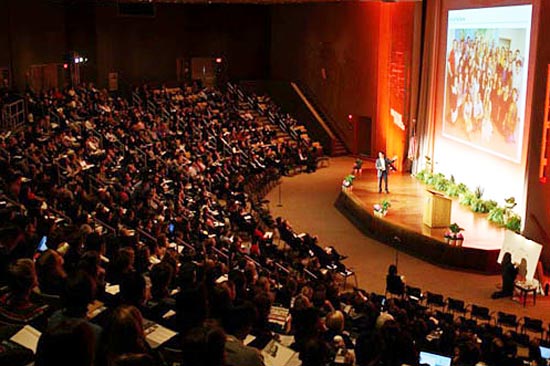(Note: As part of my job now as a marketing keynote speaker, I also offer services as a public speaking coach.)
Speaking at conferences is an underrated marketing strategy. It’s one thing to focus, for example, on SEO, social media, and lead generation – but it’s all online and impersonal. It’s also beneficial to be in the real world and connect with flesh-and-blood people.
Of course, many marketing and PR professionals already know this. It’s why the competition to speak is fierce. So, we interviewed executives at three major marketing conferences to discover what tips they would recommend for people who want to be selected to speak at such events.
(Disclosure: I have spoken or have submitted to speak at some of the following events, and I have contributed to Moz’s blog. However, I have selected the following online-marketing conferences to present an objective, representative sample of the various types of conference formats. I also invited several other event holders to comment, but they declined – usually stating that they did not want to reveal anything about their speaker-selection processes.)
To be objective, I have included the interviewees’ comments in full below without any changes. I have edited only for grammar and occasional clarity (as in identifying “Matt Cutts”).
The Interviewees
In alphabetical order by last name:



The Questions
1. What, in general, is your strategic approach to deciding which speaker pitches to select?
McGillivray (Moz): MozCon’s a little different in that we’re almost invite-only, except for four community speakers.
For invite-only people, we create a huge list – for 2014, it was around 80 people – of amazing speakers in online marketing and then start vetting them. We balance out selecting people engaged in hot industry topics and those speaking to solid topics people can’t get enough of. We also pay attention to make sure our choices have industry leaders and up-and-coming voices. And I believe conferences who only have white men speaking aren’t working hard enough. If you can only find Caucasian men living up to your conference’s standards, then your standards are biased and your worldview narrow. Usually, it takes us about three selection rounds in order to pick all our MozCon speakers with a committee of five staffers.
In 2012, we started the Community Speaker program at MozCon. It was the first time that we had people pitching to us. We adore our amazing community, and it’s been such a wonderful experience to work with community speakers and see how attendees love them. We have a bit of a bigger committee to select these speakers – 9 people – so we can make sure to pick the best. We do “blind” evaluations that only look at their topics, without names, to help not to be biased and then we dig in from there. We get around 150 submissions every year.
Osmeloski (SMX): At SMX, our goal is to provide a comprehensive view on a given topic – which to us, means providing meaningful takeaways for marketers in organizations of any size – small, medium and large enterprises alike. In any given session, we look for a mix of speaker pitches that speak to both the strategic level and provide real-world tactical examples that attendees can put into action the minute they get back to the office.
Treanor (ad:tech): Selections are ultimately decided on the topic proposal’s relevance and depth of information in context with the attendee learning needs. If two similar topics are being pitched, the topic that has the most structure and outlines a clear thought process with key deliverables will be selected.
2. Some conferences post agenda topics and then invite pitches based on those topics. Other conferences ask people to submit their own proposed topics. Why do you use your chosen method?
McGillivray (Moz): For us, it’s more that we don’t want our community speaker topics overlapping with what our other speakers are talking about. It’s a hard balance in that, due to timing, usually we don’t have a complete topic schedule to share with everyone. For 2014, we had several pitches that cited our lack of content marketing, not knowing that speakers who don’t stand out as “content” people were diving in. We mostly want speakers who are excited about their topic, so giving them leeway to choose their own works better for driving passion and uniqueness.
Osmeloski (SMX): We like to do a mix of both, actually, to make sure we’re providing an agenda that hits on all the major areas of digital marketing. The topics which we editorially select are in part driven by the popularity of topics we cover at Search Engine Land and Marketing Land, but it’s also great to hear pain points from in the trenches marketers that we might be overlooking.
Treanor (ad:tech): We’ve been using a Call for Sessions asking speakers and thought leaders to submit their topic ideas. This method of conference programming provides a broad spectrum of topics with unique points-of-view from individuals who are in the trenches of digital marketing. That said, we are changing the way we program content using a hybrid of posted topics and the Call for Sessions.
3. Can you tell when people submit pitches themselves or when PR agencies submit them on their behalf? If so, how? Do you prefer one over the other? If so, why?
McGillivray (Moz): Usually with open-pitch community speaker calls, we don’t see PR agencies pitching for their clients. Myself and others do get many e-mail pitches throughout the year from PR agencies, and typically, we politely tell them that we don’t accept pitches for main speaker slots. While I would never fault a busy speaker from using a PR agency, unfortunately, I’d say 90% of those pitches aren’t anywhere near the quality-level or type of content that we’d want for MozCon. Not to mention, they ask a lot of questions about our conference that shows there hasn’t been any research done about our show and if it would actually be a good place for their client.
Osmeloski (SMX): Absolutely – but our pitch form allows a space for “PR representative” to be named in addition to the speaker. Pitches by PR agents are great as long as they are on topic and provide relative detail, not just broad buzzword-speak or thinly-veiled sales pitches for the given product. You can tell which PR people really “get it” by the structure of the pitch, and it’s always obvious when a speaker works closely with the PR team to deliver a meaningful pitch, full of good content that will actually match up with what they present at the event.
Treanor (ad:tech): It is very easy to distinguish the pitches submitted by a PR agency rather than the individual who is speaking. In our case, we ask who is submitting the session on the submission form so we know who is pitching the topic. The pitch sent by the PR agency is usually very well-written, touches on all the points the organizer wants to see and essentially sell the topic. Pitches from the speaker or the speaker’s company often lack clarity and sell the speaker instead of the topic. My favorite is seeing a concise pitch directly from a respected speaker. It feels more authentic and gives me a chance to hear the “voice” of the speaker without any interference.
4. What are your recommended best-practices for submitting pitches?
McGillivray (Moz): You want to make sure that your pitch has solid information about what you’re going to be talking about with actionable points and an interesting angle that shows you’re interested in it. Don’t hide your information from conference runners. For example, if your point is “we did X a/b testing and saw an 80% lift in sales,” make sure that you define “X” and don’t hide it from the person reading your pitch.
Also don’t forget to include videos of you speaking and slide decks of past presentations when they ask for more information. I totally realize that speakers have to start somewhere, and if you don’t have any video of you speaking, make it happen! Record yourself presenting. Make slide decks. Show that not only do you have a great pitch, but you have some kind of track record or amazing potential.
Osmeloski (SMX): The most-compelling pitches are those that back up their expertise with specific data points, whether that’s % lift, revenue or ROI data, audience stats, or conversion metrics that build credibility within the pitch itself. Providing 5-10 clear, concise takeaways or action items for the audience to put into action for their own brand or client sites. It’s one thing to talk about what you’re going to talk about, it’s quite another to prove that you really will deliver the goods. Finally, providing a pitch that truly is fresh makes us stand up and take notice. From a planning point of view, it’s rather disappointing when someone pitches you a topic they’ve “given the same presentation on at x,y and z” industry events. As conference organizers, we want our events to stand out from others as providing something unique.
Treanor (ad:tech): First and foremost, follow the instructions given by the organizer on how to submit a pitch. The best pitches need to include the following:
1. The Challenge – outline what is the topic pitch’s challenge or pain point being felt by the audience
2. Key Points – include three key talking points that will be presented. These should be the most important pieces – don’t hold back information
3. The Solution – deliver how the instruction and learning from the presentation will solve or improve the attendees work or personal lives
5. How do you allocate spots between established influencers and new speakers who have something interesting to say?
McGillivray (Moz): For MozCon, it’s hard to balance all the incredible talent that we want to invite back and getting new people onto the stage. We limit how many people we invite back – especially if they spoke the year before – and then fill the other slots with new speakers or people from years back. It’s really hard though. With all that talent from past MozCons and new people, I could probably program two weeks of MozCon. 🙂
Osmeloski (SMX): This is a tricky one, and there is no strict formula. On the one hand, you want the established influencers who you know will deliver expected value to the audience, and it’s great with those speakers deliver something fresh each and every time. When you invite a new speaker, you’re always taking the chance that they may fall a little short of expectations. With proper preparation, planning and communication, this risk can be reasonably mitigated. Choosing new speakers is not necessarily about speaking experience or polished speaking skills; the most important thing is how well they know their topic inside and out. It can also be incredibly rewarding when a fresh new face becomes a rising star, if they have knowledgeable things to share.
Treanor (ad:tech): There is no magic or secret formula to balancing established influencers with new speakers and usually, they naturally balance themselves out during content programming.
6. If someone is interested in speaking at your conference, what would you say is the benefit to him or her?
McGillivray (Moz): MozCon can really turn an up-and-coming speaker from someone kind of known to an industry leader. We’ve seen people get new jobs, tons of clients, grow their business, get other speaking gigs, and more from being on the MozCon stage.
Osmeloski (SMX): The obvious benefits for an agency/consultant or vendor speakers is prospective customers, so these types of speakers really need to prove they add value, and not just deliver a sales pitch. (Note: all of our “sponsored sessions” are clearly defined, and we do not have any paid speaking slots on our main sessions.) The not-so-obvious benefit for many speakers is validation of their efforts by respected colleagues, or opening the door to sharing information and learning from each other’s success and failures. Career advancement is another overlooked value; some speakers may be offered dream jobs based on the knowledge they display in their presentations or they main gain more confidence in their internal presentations to executives.
Treanor (ad:tech): Everyone wants to be considered a “thought-leader” in their industry and speaking at ad:tech will vault him or her very quickly into this role. Aside from this reason, the connections made at the conclusion of a speaker’s session is very valuable in addition to having “spoke at ad:tech” on your LinkedIn profile looks really good.
7. What general best-practices would you recommend as far as speaking and presenting?
McGillivray (Moz): Get as much practice as you can before you speak. Don’t make the mistake of tweaking your deck or finishing it last minute, giving yourself no time to practice. (Plus, it makes conference organizers happy to have your deck early.) At MozCon, we see speakers who really succeed have three things in common:
1. Excellent, actionable knowledge to share with our audience.
2. A well-designed slide deck – doesn’t have to be super fancy – that clearly helps to convey their information.
3. A polished talk that’s been practiced somewhere between 8-15 times.
Also, if you plan on speaking at multiple conferences and it being part of your career, study up on how to be a better speaker. Here are some resources that I suggest speakers read and watch:
Books:
HBR Guide to Persuasive Presentations by Nancy Duarte
slide:ology: The Art and Science of Creating Great Presentations by Nancy Duarte
Resonate: Present Visual Stories that Transform Audiences by Nancy Duarte
Articles:
How to Give a Killer Presentation by Chris Anderson, curator at TED
How to Become a Confident Public Speaker by Matthew Capala
The Evolution of My Public Presentations by Rand Fishkin
The Making of SearchLove by Mack Fogelson
Too Busy To Succeed: How I let ‘busyness’ make me choke at MozCon by Adam Audette (make sure to read the comments too!)
11 Things To NEVER Say In A Presentation by XCamilleWong
Videos:
TED: The secret structure of great talks by Nancy Duarte
8 Rules for Exceptional Slide Presentations – Whiteboard Friday by Rand Fishkin
30 Tips for Awesome Presentations – Video and Slides by Ian Laurie
Osmeloski (SMX): To name a few:
- Be proactive in your communication with conference organizers; make sure you are delivering the right type of content for their audience.
- Make sure you’re aware of all the pertinent logistics: including deadlines, presentation formats and technical specs, time limit, etc.
- When you deliver an in-depth pitch, make sure your presentation delivers on all the topics you said you would cover, unless otherwise revised or approved by organizers.
- Be prepared. It takes a lot of time and effort to deliver a strong presentation, make sure you put the time into crafting your message, before you even think about putting a single pixel into a slide deck.
- If it’s a panel discussion, make sure you have some rough ideas of topics you’ll be covering and take time to prepare thoughtful answers ahead of time.
- Not everyone is a great presentation designer, but we all know that boring, bullet or text heavy presentations can be tough to follow. You need to also think about how clearly your presentation can be seen from the back of a room; you need to think about how different lighting or fuzzy images be affected at different projections, under dark or bright lights. If you don’t have a graphics design or marketing department on hand to help you build a visually appealing presentation, you can learn a lot about how to create a compelling deck from online resources.
- Be respectful of fellow speakers and conference organizers when it comes to presentation preparation and related deadlines or other expectations. Yes, you may be ‘busy’ but we all are. If you’ve pitched to speak, then you’ve agreed to make the time to deliver a strong effort. This means practicing your talk so you don’t rush or go over in time. Remember, attendees have also invested in learning from you, don’t disappoint them.
- Be professional in your presentation. Humor is fine, as long as you are delivering quality information in a respectful way, taking care not to use offensive imagery or language.
- Always ask conference organizers for honest feedback and constructive criticism on how you could improve your future presentations.
Treanor (ad:tech): Market your session as far in advance as possible. Often, speakers think the event’s marketing is enough, but with all the sessions being promoted plus the other events happening at the show, your session may not heard. Speakers who market the session to their own clients and followers typically have more attendees than those who don’t. While in the session room before the presentation starts, interact and engage with the attendees. Ask them where they are from, what is their role in the company and what do they want to learn. In addition to the networking, the best speakers will often tailor their presentation on-the-spot to the audience in the room. If a wireless microphone is provided, always use it even if the room is very small. Strong, trained voices will lose clarity during a long presentation and you want your message to be heard. If you really want to wow your attendees, follow-up with them by providing updates and more information either directly or through the event organizer. We always urge new speakers to join Toastmasters to improve their public speaking skills and gain confidence.
8. There are many marketing conferences in the world. What differentiates you and makes you stand out?
McGillivray (Moz): Due to our selection process and our commitment to show details, MozCon is filled with three days of future-thinking knowledge and is a world-class experience for everyone. Our show is single session, one stage; so everyone’s eyeballs are the current speaker – no choosing between sessions – and we have a pretty nifty A/V to showcase speakers. We want attendees to take information directly from the conference and apply it to their business’ online marketing.
Osmeloski (SMX): SMX is known for delivering in-the-trenches, tactical advice and practical tips for SEO, SEM, and social-media marketing. But it’s important that we also take a step back and balance that with big picture, marketing strategy and take a look at all the major issues and opportunities in digital marketing with a holistic approach.
Treanor (ad:tech): The ad:tech brand is well-known and respected internationally based on our track record of consistently providing a community for marketing and technology professionals to buy and sell, network, and exchange ideas. Unlike most marketing conferences focusing on one niche practice within digital marketing, ad:tech brings all digital marketing forms together in one place.
9. Without naming names, of course, can you give examples of the worst pitches and presentations you’ve seen? And the best ones?
McGillivray (Moz): Well, I did get a pitch from someone pretending to Matt Cutts [the head of Google’s web-spam team]. 🙂 The worst pitches by far show that the potential speaker doesn’t understand something about MozCon, whether it’s what we look for, what type of presentations we do, or general information about our business.
The best ones have focus of topics. They pull you in with the title and hammer it out with the details in a concise manner. My breakdown of one of the best pitches I’ve received.
Osmeloski (SMX): The worst ones by far are the ones that are completely off-topic or not relevant to our audience. But beyond that, the pitches that are too broad and don’t really share enough details to be compelling are among the worst offenders; as are those which try to rely on past speaking slots alone. Some of the most impressive pitches are those that completely blow away the competition by providing not just specific data, but links to spreadsheets or example documentation that supports your pitch. In addition, links to videos of past speaking engagements really help if we’ve never seen or heard you speak before.
Treanor (ad:tech): The worst ones are the pitches that have absolutely NOTHING to do with our conference program. We’ve seen a lot of the “Jane Doe is a world famous memory expert” (no, that is a real submission received) – which is so far off from digital marketing. Researching and understanding the audience make-up for the conference you’re asking to speak at is essential. I like concise, but that one went overboard. In 17 years, I’ve come across a lot of bad presentations and have had a few “infomercials” pulled on me, which never ends well for me or the speaker. But by far, though, the worst was a speaker who discovered he had a severe stutter when he got nervous. We’d worked together for months planning his first solo presentation and had everything meticulously prepared. He had previous speaking experience on panels but doing a solo presentation put him on extreme edge and the stutter appeared. It was so bad people walked out and questioned why I put a person with a severe speech impediment on stage. I felt bad, the speaker felt bad, and afterwards we sent a video to the attendees explaining what happened and a recorded version of the presentation he planned to give. There have been a lot of really great pitches, which should be expected when it comes to digital marketers. My favorite pitches usually are the ones that are willing to bleed a bit, showing not just the success stories but the troubles and pain encountered.
The Takeaways
I can tell you some personal stories. As a result of speaking at various conferences, I have gained the following:
- Befriending influencers and other people in the industry
- Getting more social-media followings and quality backlinks from the presentations and resulting coverage
- Obtaining leads from people coming up to us after talks and during the conferences in general and giving us their business cards
- Having fun at the “after-conference” events! (But I’ll keep that “off the record.”)
Of course, speaking at such events is not cheap. It costs travel, hotels, and food. But the connections made between “real” people in the “real” world are invaluable. It’s just one reason that part of our PR and other marketing work entails helping clients to get chosen to speak at relevant conferences.
I hope that these interviews will help you to achieve the same thing. Good luck!
And see how I can help you as a public speaking coach!
